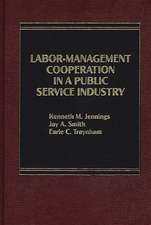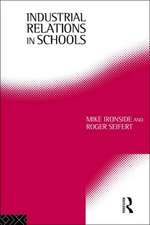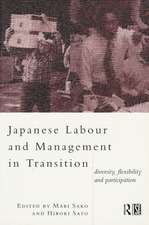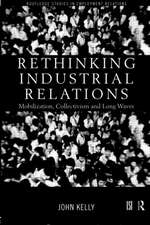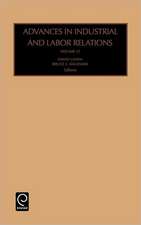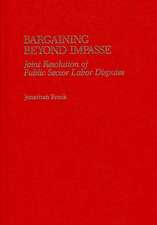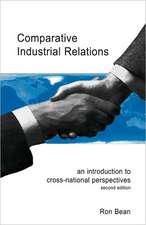Rediscovering Collective Bargaining: Australia's Fair Work Act in International Perspective: Routledge Studies in Employment and Work Relations in Context
Editat de Breen Creighton, Anthony Forsythen Limba Engleză Paperback – 7 iun 2017
| Toate formatele și edițiile | Preț | Express |
|---|---|---|
| Paperback (1) | 416.22 lei 6-8 săpt. | |
| Taylor & Francis – 7 iun 2017 | 416.22 lei 6-8 săpt. | |
| Hardback (1) | 1067.84 lei 6-8 săpt. | |
| Taylor & Francis – 10 aug 2012 | 1067.84 lei 6-8 săpt. |
Din seria Routledge Studies in Employment and Work Relations in Context
-
 Preț: 393.57 lei
Preț: 393.57 lei -
 Preț: 310.75 lei
Preț: 310.75 lei -
 Preț: 311.41 lei
Preț: 311.41 lei -
 Preț: 310.70 lei
Preț: 310.70 lei -
 Preț: 383.12 lei
Preț: 383.12 lei - 15%
 Preț: 460.25 lei
Preț: 460.25 lei - 12%
 Preț: 298.41 lei
Preț: 298.41 lei -
 Preț: 438.86 lei
Preț: 438.86 lei -
 Preț: 411.64 lei
Preț: 411.64 lei -
 Preț: 417.20 lei
Preț: 417.20 lei - 15%
 Preț: 672.58 lei
Preț: 672.58 lei - 18%
 Preț: 999.51 lei
Preț: 999.51 lei - 19%
 Preț: 257.68 lei
Preț: 257.68 lei - 25%
 Preț: 499.81 lei
Preț: 499.81 lei -
 Preț: 481.60 lei
Preț: 481.60 lei - 18%
 Preț: 895.02 lei
Preț: 895.02 lei -
 Preț: 482.94 lei
Preț: 482.94 lei - 28%
 Preț: 711.26 lei
Preț: 711.26 lei -
 Preț: 451.32 lei
Preț: 451.32 lei - 17%
 Preț: 241.15 lei
Preț: 241.15 lei - 15%
 Preț: 687.11 lei
Preț: 687.11 lei - 15%
 Preț: 674.24 lei
Preț: 674.24 lei -
 Preț: 387.75 lei
Preț: 387.75 lei - 13%
 Preț: 297.57 lei
Preț: 297.57 lei - 18%
 Preț: 1000.27 lei
Preț: 1000.27 lei - 26%
 Preț: 179.10 lei
Preț: 179.10 lei -
 Preț: 489.26 lei
Preț: 489.26 lei - 30%
 Preț: 1017.18 lei
Preț: 1017.18 lei -
 Preț: 462.25 lei
Preț: 462.25 lei -
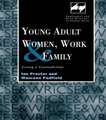 Preț: 389.66 lei
Preț: 389.66 lei -
 Preț: 416.22 lei
Preț: 416.22 lei - 18%
 Preț: 1001.55 lei
Preț: 1001.55 lei
Preț: 416.22 lei
Nou
Puncte Express: 624
Preț estimativ în valută:
79.65€ • 85.17$ • 66.41£
79.65€ • 85.17$ • 66.41£
Carte tipărită la comandă
Livrare economică 17 aprilie-01 mai
Preluare comenzi: 021 569.72.76
Specificații
ISBN-13: 9781138109506
ISBN-10: 1138109509
Pagini: 362
Ilustrații: 27
Dimensiuni: 152 x 229 x 19 mm
Greutate: 0.45 kg
Ediția:1
Editura: Taylor & Francis
Colecția Routledge
Seria Routledge Studies in Employment and Work Relations in Context
Locul publicării:Oxford, United Kingdom
ISBN-10: 1138109509
Pagini: 362
Ilustrații: 27
Dimensiuni: 152 x 229 x 19 mm
Greutate: 0.45 kg
Ediția:1
Editura: Taylor & Francis
Colecția Routledge
Seria Routledge Studies in Employment and Work Relations in Context
Locul publicării:Oxford, United Kingdom
Public țintă
Postgraduate and UndergraduateCuprins
1. Rediscovering Collective Bargaining Breen Creighton and Anthony Forsyth 2. Collective Bargaining and Agreement-Making in Australia: Evolution of the Legislative Framework and Practice Peter Gahan and Andreas Pekarek 3. International Labour Standards and Collective Bargaining under the Fair Work Act 2009 Breen Creighton 4. The Role of Fair Work Australia in Facilitating Collective Bargaining Richard Naughton 5. The Mechanics of Agreement Making under the Fair Work Act 2009: Promoting Good Faith Bargaining and Genuine Agreement Amanda Coulthard 6. The Relationship between Protected Industrial Action, Recognition and Bargaining in Good Faith under the Fair Work Act 2009 Shae McCrystal 7. Getting to the Table? Fair Work, Unions and Collective Bargaining Rae Cooper and Bradon Ellem 8. Industrial Conflict with Awards, Choices and Fairness David Peetz 9. Government as Industrial Relations Role Model: Promotion of Collective Bargaining and Workplace Cooperation by Non-Legislative Mechanisms John Howe 10. Comparing Purposes and Concepts in United States and Australian Collective Bargaining Law Anthony Forsyth 11. Recognition in Respect of Bargaining in the United Kingdom: Collective Autonomy and Political Neutrality in Context Alan Bogg and Tonia Novitz 12. The Canadian Conception of Collective Representation and Bargaining Sara Slinn 13. After EFCA, What Next for Unions? The Future of Labour Law Reform and of Collective Bargaining in the United States John Logan 14. Collective Bargaining and Food Faith Obligations in New Zealand Pam Nuttall Notes on Contributors Notes Bibliography Index
Recenzii
"Captures well the emerging global trend towards collectivization legislation as portrayed by Australia’s Fair Work Act of 2009 and comprehensively subjects that trend to the scrutiny of comparative law perspective." – Paul Secunda, Marquette University, USA
Descriere
This book examines countries that have tried, with varying degrees of success, to use legislative strategies to encourage and support collective bargaining, including Australia’s Fair Work Act. It is the first major study of the operation and impact of the new collective bargaining framework introduced under the Fair Work Act, combining theoretical and practical perspectives. In addition, a number of comparative pieces provide rich insights into the Australian legislation’s adaptation of concepts from overseas collective bargaining systems – including good faith bargaining, and majority employee support as the basis for establishing bargaining rights. Contributors to this volume are all leading labor law, industrial relations, and human resource management scholars from Australia, and from Britain, Canada, New Zealand and the United States.

